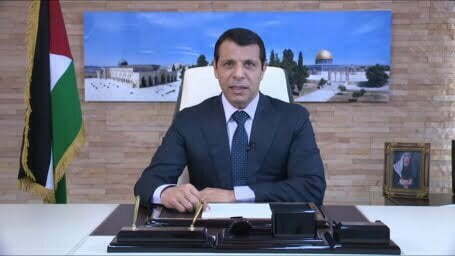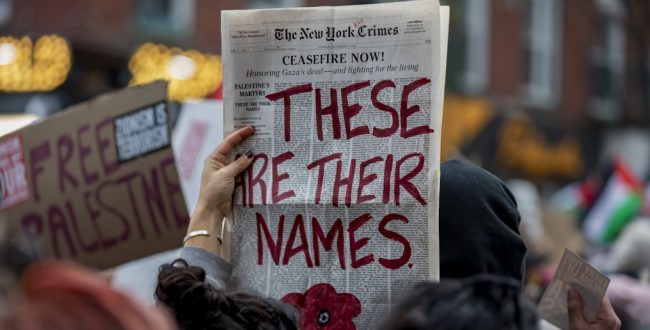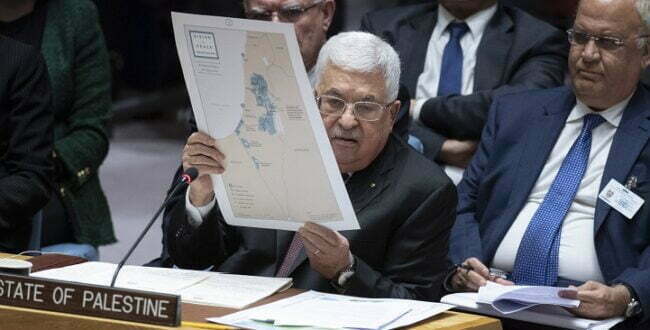Memorial rallies for leaders are often battlegrounds for politicians wishing to inherit their position. The November 20 mass protest organized by the Fatah movement to mark the 14th anniversary of Yasser Arafat passing turned into a rally of support for Muhammad Dahlan. The rally, therefore, offers a glimpse into the possible future trajectory of Fatah in the era following Abu Mazen’s reign.
During last year’s memorial rally to Arafat, Hamas allowed its rival movement, for the first time since Hamas took over Gaza in 2007, to appear in the streets with Fatah’s yellow flags alongside the flags of Palestine. In a recorded speech from Ramallah, Abu Mazen used the rally to call for Hamas to give up their weapons as a precondition for reconciliation, “with the goal of achieving one state, one law and one legal weapon.”
This year, the keynote speaker at the rally was Abbas’ sworn enemy, Mohammed Dahlan, the former head of Preventative Palestinian Security in the Gaza Strip. Dahlan was suspended from Fatah’s ranks in June 2011 on accusations of corruption, allegations that he was involved in murdering Arafat and in a coup attempt against Abbas. Dahlan departed to exile in Dubai and has not returned since to the Palestinian territories. Dahlan’s recorded speech was first and foremost a scathing indictment of Abbas, while adopting a conciliatory tone toward Hamas: “the wonderful supporters of Fatah… you have once again begun to demand liberty after the discouraged, the delusional and the shriveling tried to prevent you from achieving this great scene,” stated Dahlan, in a particularly clear critique of the Ramallah government. “This gathering exposes their failure and proves to the entire world that your reformist approach is a sweeping national current… you chose a path that will not stop until Fatah is returned from its captors, and the national compass is once against pointed in the right direction.”
Dahlan established two concrete goals for correcting Fatah’s “national compass:” establishing “national partnership” with all Palestinian factions, including Hamas and Islamic Jihad, and drafting a “plan of struggle” that will lead to political independence. At the end of the speech, Dahlan targeted Abu Mazen’s soft underbelly: his avoidance of visiting the Gaza Strip (following assassination attempts against him and his Prime Minister, Rami Hamdallah, in recent years.) Dahlan called on Abbas to arrive in Gaza and declare the establishment of a national unity government that will include all factions. He demanded that the temporary leadership body of the Palestine Liberation Organization (PLO), which was established during the 2011 Palestinian reconciliation attempt, will meet in Cairo to “rebuild the political system on new foundations that will fit the demands of the political campaign.”
The indirect call to include Hamas and Islamic Jihad in the PLO incenced Fatah’s establishment in Ramallah: “Those fleeing from justice do not have the right to speak about the national manner and must instead appear in court,” proclaimed the official Fatah statement . Two days before the rally, Fatah’s Spokesman, Atef Abu Sayf, declared that Hamas prevented Fatah this year from holding a memorial ceremony for Arafat in Gaza this year. Abu Sayf argued that Fatah members who still insist on marking the event while “Yasser Arafat’s sons are being thrown in prison” by Hamas, are collaborating with political oppression in the Gaza Strip.
Holding the ceremony with Dahlan’s participation indicates that Hamas apparently decided regarding its preferred successor to Abbas. A year ago, Arab media reported on the rapprochement between Hamas and Dahlan. According to an article published in the al-Hayat newspaper last year, the response of the Palestinian Authority’s leadership to Dahlan’s rising popularity was supposed to be convening the PLO’s Palestinian National Council and holding elections to pump new blood into the organization. These elections were never held.
Despite the show of support to Dahlan in Gaza, it appears that his popularity is still abysmal. A poll conducted in September by Khalil Shiqaqi’s Palestinian Center for Policy and Survey Research in cooperation with the Konrad-Adenauer Foundation, showed that only 6% of Palestinian see him as a possible successor to Abu Mazen, while 33% would like the jailed leader Marwan Barghouti to assume this role, and 20% support the head of Hamas’ political bureau, Ismail Hanniyeh. In Gaza, Dahlan earned the support of 16%, while the support for him in the West Bank stands at 1% only.
The general lack of trust among Palestinian toward their political leadership manifested in the words of the Palestinian journalist Yasser al-Zaatra. In a tweet, Zaatreh quoted the critique of a senior Fatah member Usamah al-Qawasmy toward Dahlan. According to Qawasmy, Dahlan “betrayed Arafat during his lifetime and conspired against him in the siege on him.” Zaatreh simply remarked: “the problem is that Dalhan was Abbas’ ally at the time.”


















